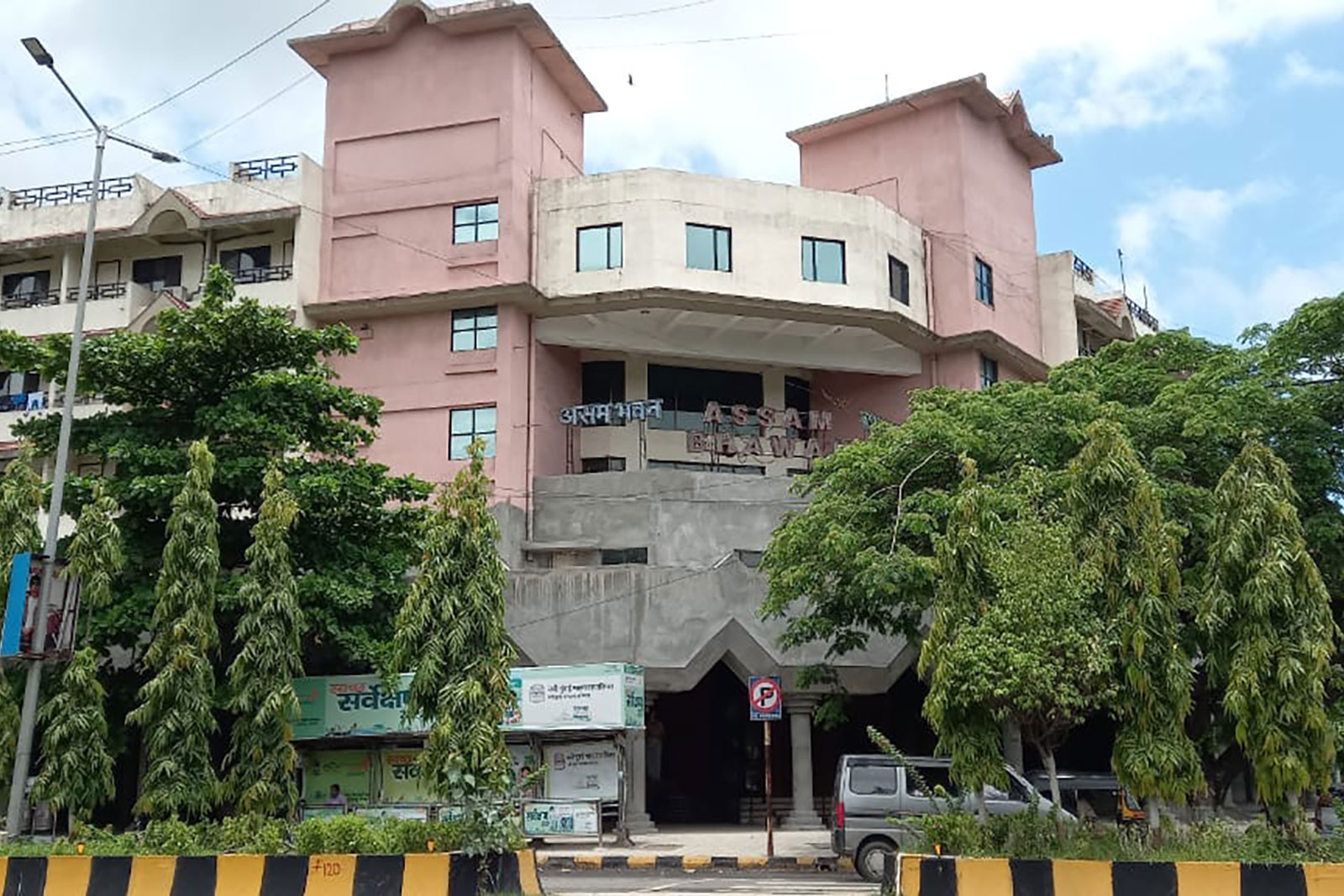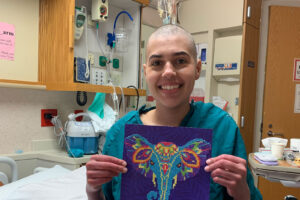Sometime in 2003, Devashish Sharma moved from Assam—a small state in India’s far northeastern region—to Mumbai, a bustling financial center and the country’s most densely populated city. At that time, Sharma was the deputy resident commissioner of Assam House located in Vashi, a neighborhood in Navi Mumbai (New Bombay). Until he moved, the House was derelict—cobwebs covered windows, battered old floors and defunct electricity.
In the early ‘90s, the then chief minister of Assam, Hiteswar Saikia and Sharad Pawar, chief minister of Maharashtra, were close friends. The Assam Association of Mumbai requested Saikia for the Assam House which could be used as space for cultural exchange between the two states, or a space for students, patients and tourists. Saikia requested Pawar for a plot of land.
At the time, Navi Mumbai was developing and all Indian states were allowed to take a plot of land in the area to build their respective state houses. In 1995, Assam inaugurated the building and opened a small emporium for arts and crafts. “But, due to unforeseen reasons, this only lasted for a day and the Assam House shut down the very next day. The locks didn’t open until I moved,” Sharma says.
Sharma took it upon himself to get the place fixed. In a few days the Assam House was functional. People living in the neighborhood noticed lights lit up and went up to Sharma to congratulate him. Through them, Sharma learned about cancer patients who traveled thousands of kilometres from smaller cities, towns and villages to Mumbai’s Tata Memorial Hospital — India’s largest tertiary cancer care facility. He realized that many of these patients couldn’t afford to live in an expensive city like Mumbai for a prolonged period of time and needed accommodation while undergoing treatment.
“Patients are willing to travel the distance but they need a place to stay,” says Sharma. “We have often seen patients living on the pavements outside the Tata Memorial Hospital. When they run out of money, they sleep on the streets. Cancer treatment cannot get done in a few days. It takes months. I wanted to help, even if it is in a small way.”
According to the World Health Organization, cancer is the second leading cause of death globally and was responsible for an estimated 9.6 million deaths in 2018. Worldwide, about one in six deaths is due to cancer. In India, more than 1 million people are diagnosed with the disease every year. According to data from the Tata Memorial Centre, a grant-in-aid body under India’s Department of Atomic Energy, 100 out of every 100,000 urban Indians suffer from cancer. The number falls to 60 in rural India. In the United States, 300 out of every 100,000 people suffer from cancer. In developed countries, people tend to live well into their old age, often leading to higher cancer rates despite better health care facilities.
According to a 2015 study by Ernst and Young, in India, there are only 250 dedicated cancer-care centers, 40 percent of which are available in eight metropolitan cities and fewer than 15 percent are government-operated. Therefore, 80 percent of India’s cancer cases are diagnosed at a late stage. It’s one reason why 68 percent of patients with cancer die of the disease in India compared to 33 percent in the U.S. To combat this, many patients travel vast distances to cancer centers within India for treatment.
Sharma created a report for the government and included a signed petition from cancer patients at Tata Memorial Hospital asking for accommodation for those who belong to low-income and marginalized backgrounds and have to travel long distances to avail care. The government heard their plea and in June 2004, Assam House opened up for cancer patients. Over the years, patients from all over the country, especially from the northeastern belt of India, have arrived at the Assam House while searching for a place to stay during treatment.
According to the Indian Council of Medical Research, between 2012 and 2014, the seven northeastern states of India—Assam, Meghalaya, Tripura, Arunachal Pradesh, Mizoram, Manipur and Nagaland—report a higher cancer burden than the Indian average of a recorded 80-110 cancer cases per 100,000 people. In its northeastern states, this number ranged between 150-200 cases per 100,000. The health infrastructure in most of these states is not equipped to treat this caseload, forcing poor patients to travel long distances for treatment.
Bhabesh Das, an oncologist based in Assam, says cancer is a lifestyle disease. Tobacco, a lack of exercise and nutritious food, alcohol, smoking, indoor air pollution and a sedentary lifestyle are some of the leading causes of cancer in India. Some people are also genetically predisposed to the disease. “In northeast India, people consume a lot of smoked meat, the fermented variety of the raw betel nut, and tobacco consumption is high here. These are all carcinogenic substances,” Das says.
According to a 2015 study by Ernst and Young, in India, there are only 250 dedicated cancer-care centers, 40 percent of which are available in eight metropolitan cities and fewer than 15 percent are government-operated.
“Our Mumbai home (Assam House) is open to cancer patients from everywhere,” Sharma says, adding that they help patients navigate the language barrier. “Some pay Rs 150 (U.S. $2) for a bed, but there are several who can’t afford to and we try to make arrangements for them with help from other NGOs.”
In 2006, Sharma also launched the Deepshikha Foundation in Guwahati, the gateway city to Northeast India. “Initially, when it started, we were running purely on emotions,” Mrinmoyee Baruah, general secretary of the Deepshikha Foundation, says. They began with initiatives like ambulance services, cancer awareness drives, blood donation camps, help desks and screening programs.
In 2016, with the help of funders and donors, the Deepshikha Foundation created a one-of-a-kind hospice center for terminally ill cancer patients in the outskirts of Guwahati. “These patients are no longer in the curative stage. But everyone deserves dignity in death. At the hospice center, we try to keep them happy and safe,” Baruah says, adding that this is also the first hospice of its kind in the northeast region for cancer patients. “As of now, we can accommodate 15 terminally ill cancer patients. We are building 12 more rooms.”
The Deepshikha Foundation also launched Sishu Ashray Sthal, a family-centered residence in Guwahati in 2018. At Sishu Ashray Sthal, children with cancer can live with their primary caregivers for free while undergoing treatment. “Along with fighting a deadly disease, these kids belong to economically poor families. There are also indirect beneficiaries, such as a patient’s parents. When they arrive here with their child, they are usually devastated. They ask us ‘Why me?’ or ’Why my child?’ We also provide them with counseling sessions,” Baruah explains.
Abdul Majid and his daughter Shirina Akhtar are a case in point. Majid has been travelling from Bongaigaon — a small town in Assam — to Guwahati along with his 16-year-old daughter Shirina. Shirina has sarcoma, cancer of the soft tissue, in her leg. “She needs support while walking, but by Allah’s grace she is recovering,” Majid says. The Indian government’s strict COVID-19 pandemic lockdowns had been difficult for Majid and Shirina who couldn’t travel to Guwahati due to lack of transport facilities. He is now glad that his daughter’s treatment has resumed.
“We wanted to travel to Guwahati during the lockdown but my daughter is already immunocompromised. The doctors warned us that exposure to COVID-19 could have been fatal for her,” Majid says. Shirina has had four surgeries since she was diagnosed with sarcoma in 2018. Majid, who is her primary caregiver, says that each time they arrived in Guwahati, they have always lived at Shishu Ashray Sthal. “We can’t even imagine where else we would have gone. Renting a place in Guwahati is too expensive,” Majid says.
Deepshikha also provides skill-based training to cancer survivors. “Some people lose their limbs or they have families to feed so we try to empower them by teaching a particular trade,” says Sharma. “There is a girl called Jamuna, who lost one of her legs during treatment, and her father died soon after. We bought her a sewing machine and now she uses one leg to work on the machine. She has been earning around 7000 Indian rupees (100 United States dollars) a month.”
Now, people recognize Sharma as the “guy who helps cancer patients.”
“There is a tremendous sense of satisfaction,” Sharma says. He acknowledges the help he’s received from his team members and people in power. He says he could have been removed from Assam House because he had transformed the place into a space for cancer patients; usually, these state houses are occupied by government employees and their families. “But there were people who supported my cause and helped me.”
Today, there are five buildings under Deepshikha Foundation in Navi Mumbai accommodating 200 cancer patients. “There is no other state house in India dedicated to cancer patients. Assam House is unique,” Sharma says.
To learn more about the Deepshikha Foundation and how it continues to help economically challenged cancer patients in India, visit deepshikha.org.







